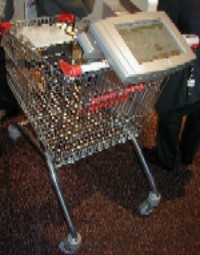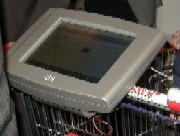Article
Wincor World Showcases Self-Checkout, Personal Shopping Assistant
Each year, Wincor Nixdorf invites the world to its headquarters in Germany to view its latest innovations. Our reporter in Paderborn explores the highlights of the big show.
February 4, 2004
PADERBORN, Germany -- When Wincor Nixdorf Inc. holds its annual Wincor World exhibition at its headquarters here, new products are usually the focus. This year's show was no exception. Held Jan. 28-30, it attracted more than 6,000 people from 40 countries.
In the self-service category, a retail technology that has been a hit in America topped Wincor's list of new ideas for Europe.
Wincor plans to develop self-checkout solutions for European markets in cooperation with retail organizations. A first prototype of the system, named "Beetle/iSCAN" was featured here.
The finished self-checkout products are scheduled to ship in 2004, according to Wincor. With more than 16,000 installations in the United States, self-checkout technology has been widely used in American grocery and retail stores since 2001.
Wincor plans to move ahead of its European competitors by customizing features for retail clients, much as it has done in its banking machines and ATM equipment. The Beetle/iSCAN product family includes configurable scan-and-pass units as well as scan-and-bag modules.
Terminal To Go
Until now, terminals used in retail stores had a serious limitation: customers had to find the terminal and go to its location to use it.
 |
Mounted at the grip of a shopping cart, the Personal Shopping Assistant (PSA) guides the customer through the store. |
The "Personal Shopping Assistant" (PSA) based on the fundamental concepts of the British company Multichannel Retail Ltd. (MRCL), is a small display mounted on the handle of a shopping cart developed by Wincor Nixdorf (see photos).
James Pemberton, managing director at MRCL, said the hardware is impressive, but that it is important to develop applications to be used with the 12-inch touchscreen terminals. He explained the process.
"First, the customer has to identify himself by sliding his customer card through the integrated card reader of the PSA. If the customer has entered a shopping list on the retailer's Web site, it will then appear on the display," he said.
To help the customer find the items on his shopping list, especially in large supermarkets, the system gives directions. In order to do so, it must know where the customer is located in the store.
"We plan a store-wide wireless local area network (WLAN) to which the PSA connects to send its location to the system," said Pemberton.
The integrated scanner enables the PSA to display the current subtotal and the total to transfer to the self-checkout system.
 |
The PSA software can be personalized at the store's Web site. |
Another fundamental concept for PSAs is the display of special offers, depending on the customer's current location. "Special offers for cereal could pop up on the PSA display when the customer enters the corresponding aisle," said Pemberton.
Another feature could be timed promotions -- for example, special offers for baked goods starting at 4 p.m. Because the system will use standard browser technology, the software and a customized user interface are easy to develop, Pemberton said.
And, according to Pemberton, the U.S. retailers Stop and Shop and Safeway each have tests of 30 PSA systems underway in American stores as a pilot project. He would not disclose, however, any information about availability and pricing of PSA systems.
Scan the Can
As of this year, a new law is in effect in Germany that regulates deposits on soda cans and plastic bottles. It was developed to encourage people to recycle and reduce the amount of household trash. It also demands retailers to implement corresponding recycling procedures.
In cooperation with the German company Prokent AG, which manufactures recycling systems, Wincor Nixdorf introduced its ACRIS RHEPRO recycle system at Wincor World. The system scans inserted cans, bottles and even beverage cradles and reads available information.
Integration with the Wincor Nixdorf POS software POSition enables a fast data transfer with the back office systems of the stores,which then calculate, charge and issue the deposit vouchers.
Developing Payment Standards
Looking at the available payment solutions today, you'll find a big mess. There is a confusing number of specifications, differing by country, industry, payment type, various types of installations as well as payment providers and network systems. To integrate these different solutions into cash register systems is expensive and requires effort.
That was reason enough for Wincor Nixdorf and other leading providers of terminal-based payment systems to search for clean-up solutions. A new "Open Payment Initiative" (OPI) was introduced at Wincor World to define standards for interfacing cash register applications and payment systems. OPI partners are European innovators such as Thales e-Transactions, Trintech and ICP Electronics.
These standards are to be integrated into all new cash register systems, at first for retailers with the store management software Trading Post and for the oil industry into the existing solution NAMOS Compact for gas stations and their convenience stores.
The OPI alliance takes up the standardization efforts of the oil industry's International Forecourt Standard Forum (IFSF). Wincor Nixdorf also wants to propose its solutions to international standardization groups for retail, such as Unified Point-of-Service (UPOS) and Association for Retail Technology Standards (ARTS).










